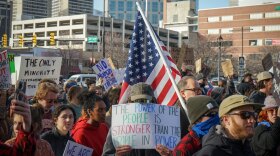
Caroline Ballard
Assistant News DirectorEmail: cballard@kuer.org
Caroline Ballard is KUER’s assistant news director. A central Virginia native and a 2014 graduate of the Columbia Journalism School, she spent the first eight years of her career as a reporter and host, greeting listeners on Morning Edition at Wyoming Public Radio and eventually coming to Salt Lake City to host All Things Considered on KUER. In 2022, Caroline became assistant news director, joining the editorial team that oversees the station’s news coverage. She has worked extensively in small podcasts, co-founding and hosting Wyoming Public Radio’s HumaNature, as well as executive producing KUER politics podcast State Street. Caroline was a 2023 Poynter/CPB Editorial Integrity and Leadership Initiative fellow and a 2024 Current Rising Star. Some of her favorite work, though, is mentoring the next generation of journalists through KUER’s internship program.
-
El ambiente afuera del Salt Lake City and County Building, y más tarde en las calles, era desafiante y ardiente. Formaba parte del “Paro Nacional”, en el que la gente se negó a trabajar o a comprar para manifestarse contra las tácticas migratorias de ICE y el gobierno federal.
-
The mood outside the Salt Lake City and County Building, and later on the streets, was defiant and fiery. It was part of the “National Shutdown,” where people refused to work or shop to demonstrate against ICE’s immigration tactics and the federal government.
-
Price hikes and password sharing crackdowns have customers reconsidering how much they’re willing to spend on streaming services. But physical media isn’t dead, and “take a movie, leave a movie” is easy on the wallet.
-
On a warm October morning, thousands came to the Utah Capitol building to protest the Trump Administration. Between the speakers, music, signs and costumes, it had the general air of a block party.
-
An autopsy showed Fnu Reena was eight weeks pregnant at the time of her death. Also among the victims were 8-month-old Anderson Garcia Cabrera Jr. and 18-year-old Hassan Lugundi.
-
A 41-year-old and an 8-month-old baby were among the people killed during WestFest, an annual festival hosted by West Valley City to commemorate its founding.
-
Salt Lake City Police have confirmed that one individual is hospitalized with critical injuries while three others, one with a gunshot wound, are in custody. The motive for the shooting remains under investigation.
-
Stephen Roberts never set out to make puzzles as a career. But he says puzzles are more than just play. They're about communication and connection.
-
The governor continues to plead with lawmakers to pass fewer bills to ease the burden on school administrators and municipal workers of implementing new laws.
-
Utah imagines a near future with advanced air mobility, but that will require more infrastructure, lower prices and sustained federal regulation.
-
Chief Justice Matthew B. Durrant’s letter is part of a larger movement opposing legislative bills that would change Utah’s courts. A letter was also sent by 900 lawyers, and the Utah State Bar Association stands in formal opposition, as well.
-
The Utah Compact’s language states a respect for the rule of law, and emphasizes that “local law enforcement resources should focus on criminal activities,” as opposed to civil infractions. Republicans like Candice Pierucci have said current legislation hews closely to that intent, focusing on people who have committed crimes.











